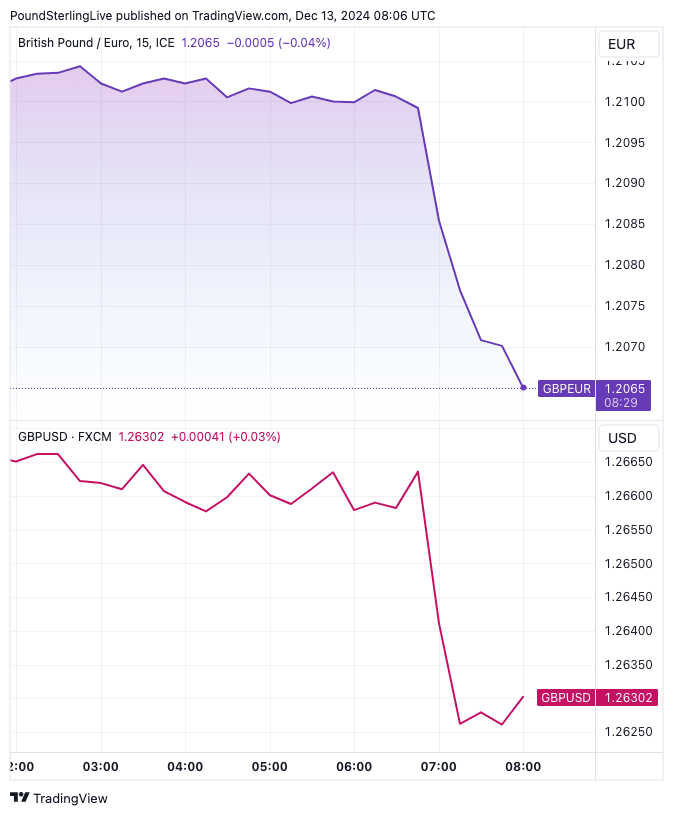UK Economy Shrinks for Second Month in a Row
- Written by: Gary Howes

Image © Adobe Images
The British Pound fell against the Euro and Dollar after it was reported the UK economy unexpectedly shrank in October as the effect of the government's negative messaging and budget started to bite.
The ONS said GDP changed -0.1% month-on-month in October, unchanged on September's -0.1%, and below consensus expectations for 0.1% growth.
The main contributor to this decline was a 0.6% fall in production output. This was due to decreases in manufacturing, mining and quarrying.
The services sector, the economy's biggest sector, showed no growth in October 2024, following no growth in September 2024.
Compare Currency Exchange Rates
Find out how much you could save on your international transfer
Estimated saving compared to high street banks:
£2,500.00
Free • No obligation • Takes 2 minutes
“It’s concerning to see a further growth disappointment for the UK," says Anna Leach, Chief Economist at the Institute of Directors. "As we head further into the festive season, and consumer confidence remains in the doldrums, many businesses are continuing the process of updating their business plans for the coming year to accommodate significant increases in employment costs."
These data will underscore the deterioration in sentiment toward the UK economy since the new government took over. The budget triggered a decline in business and consumer sentiment, which is translating into real economic outcomes.
"The UK economy shrinks for second month in a row which will be a big disappointment for Rachel Reeves. But she should not be surprised after talking the economy down through the summer and hitting businesses with a big tax grab in her autumn Budget!" says Andrew Sentance, an economist who formerly sat on the Bank of England's MPC.
Above: There was a clear FX market reaction to the GDP release.
Meanwhile, the soft GDP reading has raised expectations in financial markets that the Bank of England would cut interest rates further in 2025 than previously assumed.
This assumption shift is reflected in a weaker Sterling: the Pound to Euro exchange rate fell to 1.2085 after the data release, and the Pound to Dollar rate dropped to 1.2637.
"GBP/USD has extended its decline from $1.28 towards $1.26, whilst GBP/EUR is pulling back after closing at its strongest level in eight years against the euro earlier this week. This weakness could run further in the short term, especially if Bank of England (BoE) easing bets increase," says George Vessey, Lead FX Strategist at Convera.
🎯 GBP/EUR year-ahead forecast: Consensus targets from our survey of over 30 investment bank projections. 📩 Request your copy.
"There is every chance that the economy went backwards in Q4 as a whole," says Paul Dales, Chief UK Economist at Capital Economics. "The weak starting point for the quarter means that it is unlikely that GDP will match our 0.2% q/q Q4 forecast or the Bank of England’s 0.3% q/q forecast."
Capital Economics doesn't think this is enough to push the Bank into another interest rate cut next week, as it thinks inflation is too high.
Economists we follow say the UK economy should improve in 2025 as the government 'splashes the cash'. However, uncertainties remain over businesses' reactions to the sharp increase in the jobs tax announced in the budget.
For now, the consensus thinks the Bank of England will only be able to cut rates slowly, owing to expectations of an increase in inflation back towards 3.0%. This could limit the downside in the key GBP exchange rate.
"For the BoE, the recent weakness in activity is unlikely to be enough to prompt a further cut again at its December meeting, with stubbornly high wage growth, elevated services Consumer Price Index (CPI) inflation and uncertainty on how much of the employer national insurance contribution (NIC) hike will be passed on in the form of higher prices, keeping Monetary Policy Committee (MPC) members in wait and see mode," says Gabriella Dickens, an economist at AXA.
There is a growing risk to the Pound that the full effect of the budget on businesses only becomes apparent early in 2025, and economic data undershoots expectations.
This would raise the odds of a faster pace of rate cuts at the Bank.
"The data confirms what many are already feeling: the economy is under increasing strain. The government's recent policies, including higher taxes on businesses, have yet to take their toll. With declining production and construction output, alongside stagnation in the services sector, it's hard to ignore the signs of a broader slowdown," says Mark Posniak, Managing Director for Short Term Finance at Maslow Capital.
"Unfortunately, I suspect things will get worse before they get better as businesses and households alike adjust to these challenging conditions. It's brutal out there," he adds.
For now the consensus thinks the Pound will have another strong year ahead, but the risk is that an unexpected slowdown grips the economy and upends expectations.





